There have been a few untoward incidents that led to the Maldivians harbouring anti-India sentiments
Maldives and India are having a relationship crisis owing to media articles and social media posts attacking the dignity of the Indian High Commission office in that country. The Indian High commission wrote a letter to the ministry of external affairs that was shared with the Maldivian local media. Thecommission complained letter about the malicious and increasingly personal attacks that may damage the bilateral relations between India and the Maldives.
The Maldivian Democratic Party (MDP) released a statement that empathised with Indian diplomats and termed the attacks as derogatory. The MDP blamedthe whole drama on a local newspaper, Dhiyares, and its owner, Ahmed Azaan. The MDP believes that the anti-India campaign run by Azaan is a well-funded, tailor-made, and intricately choreographed political campaign to bring ties between the Maldives and its closest ally, India, to breaking point.
The reason for the ‘India out’ campaign was the military presence in the Maldives, which according to the locals, is a threat. The ‘India out’ campaign started in 2020 and spread across social media like a wildfire. The co-founder of the Dhiyares media, Shifxan Ahmed, clarified that they had only one issue - about the Indian military presence.
It is not the first time that an anti-India campaign had reared its ugly head. Back in 2013, when the Progressive Party of Maldives (PPM) was in power, international relations between India and Maldives took a hit. PPM, led by Abdulla Yameen Abdul Gayoom, had tilted towards the Chinese. To please the Chinese, the Yameen government indulged in anti-India slogans and policies.
Researcher Dr. Gulbin Sultana, an analyst at Manohar Parrikar Institute for Defence Studies and Analysis (IDSA), shares the same sentiment about the anti-India rhetoric of 2013. But even if the Yameen government had a biased that favoured the Chinese, they engaged in an India-first policy as well.
There have been a few untoward incidents that led to the Maldivians harbouringanti-India sentiments. The first incident was when India gifted two Dhruv Advanced Light Helicopters (ALF) in 2010 and 2015. These helicopters were to be operated by Indian officers and to be used for ocean search and rescue operations, airlifting patients across the islands, and Maritime weather surveillance. They were based in Addu atoll and at Hanimaadhoo but the pro-China stance of the Yameen government let it interpret them as proof of the Indian military’s growing presence in the Maldives. In 2016, when the agitation reached its peak, the Yameen government requested India to take back their choppers and the defence personnel. The Indian refusal to take back the choppers added fuel to the fire. In 2018, Ibrahim Mohamed Solih came to power and scrapped agreements that proscribed the use of choppers and he extended the stay of Indian personnel stay in the Maldives. Solih’s friendly stance towards India and its choppers again fuelled anti-India sentiments in the Maldives.
The Maldivian government believed in keeping terms of contracts about defence, sovereignty, and national security secret. Some groups of people interpreted this secrecy as a threat to democracy. The domestic players in the Maldives opposed agreements with India because of this lack of transparency. According to Maldivian law, any agreement has to be tabled in Parliament and needs parliamentary approval. It is only after the approval the government can engage in bilateral treaties. But the Solih government, in the name of national security, does not share any data with Parliament. The idea of keeping everything under wraps in the name of national security angers the people and fuels protests.
The second incident was the signing of Sifvaru-Uthuru Thilafalhu (UTF) harbour project agreement between India and the Maldives in 2021, under which India will be developing a Maldives National Defence Force Coast Guard Harbour. This project was initiated under the Yameen government. The dockyard is an atoll located near Malè, the capital of the Maldives.
The Indian motive behind signing this agreement was the growing presence of the Chinese in the Indian Ocean region. This agreement would satisfy the strategic interests of both India and the Maldives. But in 2019, when the Solih government came to power, media suspicion began to grow, owing to Solih’s inclination towards India about the UTF project. The Maldivian government has repeatedly clarified that they would not allow any military presence on their land, be it Indian, Chinese, or anyone else. The Maldives has repeatedly asked India not to interfere in its domestic politics.
After the threats to blast the Indian high commission in the Maldives, appropriate security measures have now been taken.
(The writer is retired Senior Professor, International Trade and Member, Vivekananda International Foundation, New Delhi. The views expressed are personal.)


























